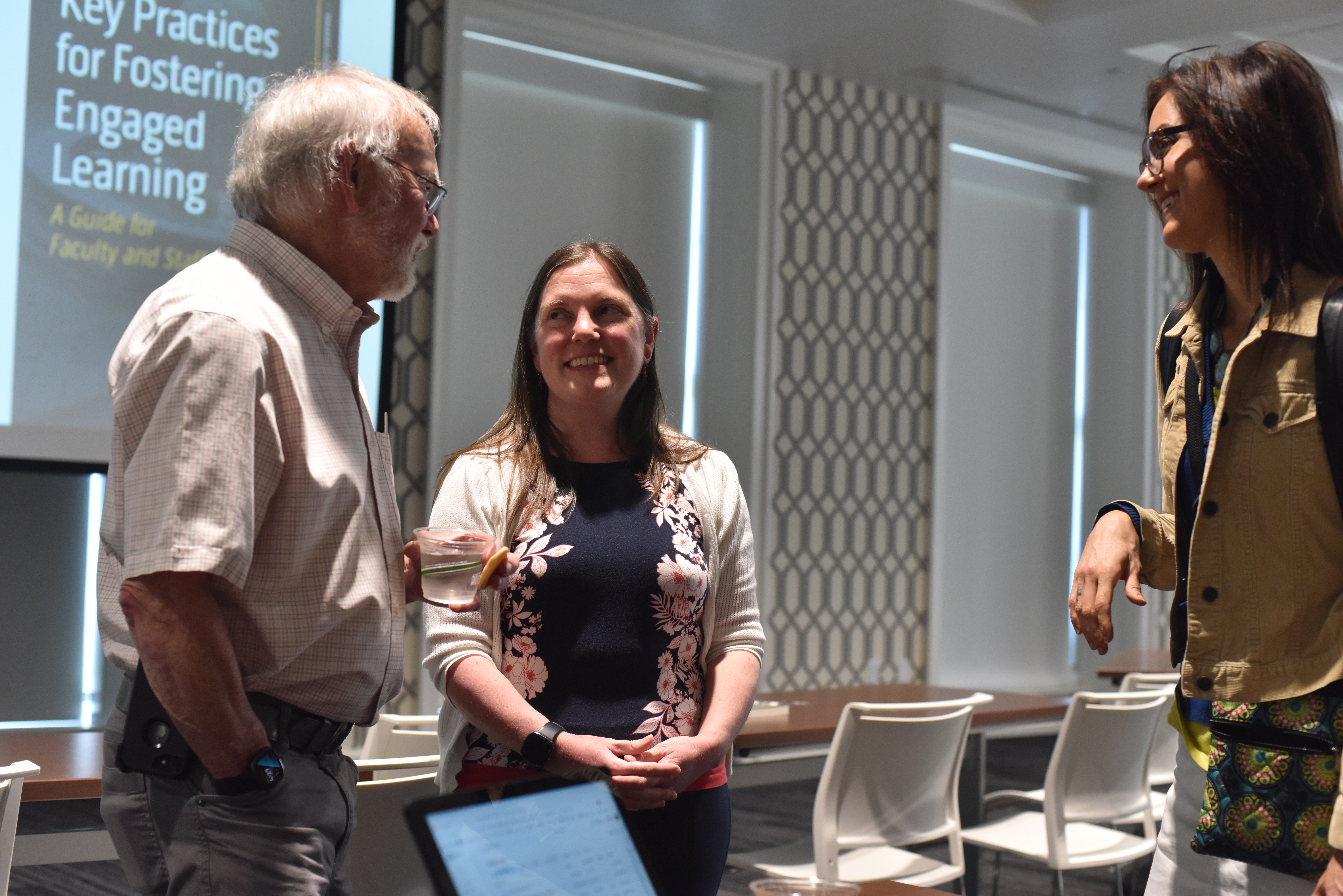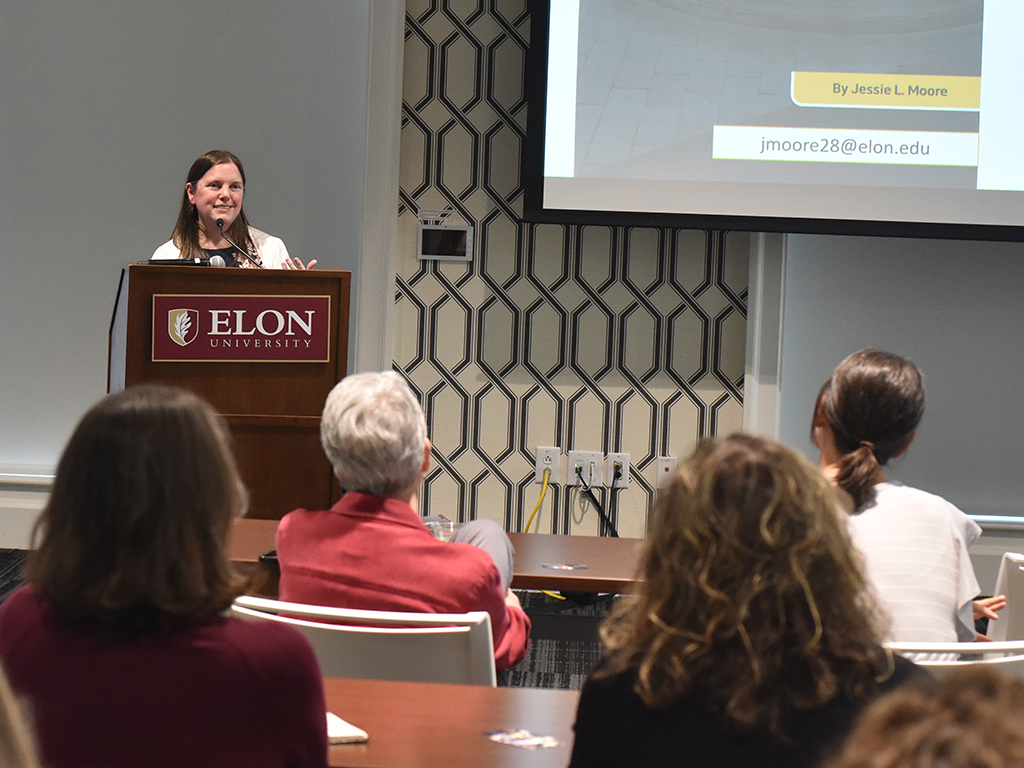Moore, director of the Center for Engaged Learning and Professor of English, was awarded the Distinguished Scholar Award in 2021 and presented her research on engaged learning during the lecture on Wednesday, April 19.
For her Cultivating Capstone research seminar, Professor of English Jessie Moore used an image of an archway on Elon’s campus. The particular archway in the image isn’t gated and multiple pathways lead to it and stem from it.
That archway is a great representation of what Elon’s faculty can provide to students, Moore said in delivering the Distinguished Scholar Lecture on Wednesday, April 19 in LaRose Student Commons. “We’re offering students multiple entry points to get to this point,” Moore, the director of the Center for Engaged Learning and Professor of English said. “And then once they go through this experience, they still have multiple choices of where they go from there.”
Moore’s lecture, “Key Practices for Fostering Equitable Engaged Learning” — also the title of her forthcoming book — addressed how faculty can better connect with students, and during her talk she highlighted her trajectory of focusing on engaged learning.
When Moore arrived at Elon in 2004, there were aspects of the campus climate that seemed too good to be true, she said. “But one of the things that really intrigued me was that we could, on this campus, commit to engaged learning and study engaged learning, and that was valued.” Receiving the Distinguished Scholar Award in 2021 reaffirms the centrality of the scholarship of teaching to Elon’s mission, Moore said.
As director of the Center for Engaged Learning at Elon, Moore plans, implements and assesses multi-institutional and multi-disciplinary research seminars for the center, which seeks to bring together international leaders in higher education to develop and synthesize rigorous research on central questions about student learning.
The answer to those central questions of student learning, Moore said, can be found through six key practices: acknowledging and building on prior knowledge and experiences of students; facilitating relationships; offering feedback; framing connections to broader context; fostering reflection on learning itself; and promoting integration and transfer of knowledge and skill.
“I’m trying with these six key practices to shift us to the things that we can do. To take responsibility as faculty and staff in fostering actable engaged learning rather than leaving it to the students to try and navigate experiences that they might not have access to,” Moore said.
One of the markers of high-quality engaged learning is recognizing each student brings their unique past experiences into a classroom, Moore told the audience. Sometimes as an instructor, it is common to make certain assumptions about students. For example, instructors should shift how they view the use of cell phones. Students are using their phones in complex ways, with many students using cell phones for most of their writing. “Sometimes what we see as a distraction is actually on target, and it may also be building on prior experiences,” Moore said.

Moore believes fostering relationships is a cornerstone to engaged learning because those relationships can create a sense of belonging while contributing to retention and degree completion. Students recognize that the mentors they have on campus serve different functions. “Students recognize that some mentors are supporting them academically, some are supporting their social connections and so forth,” Moore said. “I think that’s important to highlight because it reinforces that as we on campus think about mentoring constellations, it doesn’t have to be an exhausting endeavor if we think of it as a community endeavor.”
When faculty, staff and peers offer constructive feedback, both formative and summative, students are better prepared to understand and apply key concepts. To develop self-regulated learners, feedback must help students think about their target goals, compare their work and abilities to that target, and adjust their actions to move close to that goal.
Moore said helpful feedback is not just limited to faculty or staff but is available from peers, too.
Higher education curriculums are built on the assumption that students will transfer knowledge from course to course, Moore said. The hope is that students will integrate what they’ve learned to draw meaning from those individual courses into the new courses they are taking. This idea is easier said than done as previous studies have shown that students are trying to do this but instructors don’t recognize when they’ve attempted.
“So, we either give them feedback that seems to suggest, ‘OK, don’t try that again.’ Or, we give them feedback that they’re trying make sense of what something worked in one class but not in another,” Moore said.
A way to better engage students in thinking about transferring knowledge and skills is to ask them where in their daily life they’ve encountered similar ideas, how those ideas relate or what have they learned in the course that might help on a particular project, Moore said.
These key practices can be utilized by anyone, and fostering equitable engaged learning works best when everyone is focused on this goal, she noted.
“It’s not on any one person. If you’re working in a curriculum, in a major or minor, or if you’re working in an office, you can think about strategically scaffolding work toward these key practices over time,” Moore said. “If we work toward that, then we are working on key practices for fostering equitable engaged learning.”



